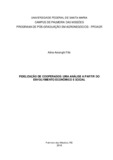| dc.creator | Flôr, Aline Ardenghi | |
| dc.date.accessioned | 2019-06-19T18:10:20Z | |
| dc.date.available | 2019-06-19T18:10:20Z | |
| dc.date.issued | 2018-03-01 | |
| dc.identifier.uri | http://repositorio.ufsm.br/handle/1/17055 | |
| dc.description.abstract | In recent years the share of agribusiness in the Brazilian GDP has been close to 25%, besides representing 45% of the country's exports. Within this scenario, the agricultural cooperatives have relevant representation, participating with about 48% of the national food production and with 11% of the Brazilian agricultural and livestock GDP. However, cooperatives are only strong, both economically and socially, thanks to the participation of their members. In this context, one of the major problems that concern cooperatives is the loyalty of their members. In the search for the answers that lead the associates to practice these acts, this research aimed to investigate which aspects influence the fidelity of the associates, analyzing the economic involvement, that are of those members that most transact with the cooperative and the social and participative involvement of the members in the cooperative's environment. For that, we used exploratory and descriptive methodological procedures, with qualitative and quantitative data, obtained through a case study of the Cooperativa Agropecuária de Produção e Comercialização de Jaboticaba LTDA. Through the research the formation of three distinct groups of associates was observed, group one is represented by the largest number of associates, but with the lowest turnover in relation to the other groups, group two presents a higher transaction volume of inputs than the other groups analyzed, and group three represented by the lower number of associates, however with the highest commercial importance, and with the largest volume of billings and grain deposits. Even the cooperative studied, not always presenting the best prices of products for both the purchase of inputs and the commercialization of the grain harvest, the cooperative in the majority, has the preference to transact with it. Regarding the social participation of the members of the cooperative, most of the interviewees are assiduous, except in cases such as lectures and courses in which the participation percentage is relatively lower. This differentiation of the members into groups allows the cooperative to identify the profile of the associates and the areas of transactions that are most attractive to the different groups of members that deal with the cooperative. In its entirety, the cooperative meets the purposes and expectations of the sample of associates studied, satisfactorily fulfilling its social and economic role. | eng |
| dc.language | por | por |
| dc.publisher | Universidade Federal de Santa Maria | por |
| dc.rights | Attribution-NonCommercial-NoDerivatives 4.0 International | * |
| dc.rights.uri | http://creativecommons.org/licenses/by-nc-nd/4.0/ | * |
| dc.subject | Agronegócio | por |
| dc.subject | Comprometimento | por |
| dc.subject | Lealdade | por |
| dc.subject | Agribusiness | eng |
| dc.subject | Commitment | eng |
| dc.subject | Loyalty | eng |
| dc.title | Fidelização de cooperados: uma análise a partir do envolvimento econômico e social | por |
| dc.title.alternative | Fidelization of cooperates: an analysis from economic and social involvement | eng |
| dc.type | Dissertação | por |
| dc.description.resumo | Nos últimos anos a participação do agronegócio no PIB brasileiro tem ficado próximo aos 25%, além de representar 45% das exportações do país. Dentro deste cenário, as cooperativas agropecuárias têm relevante representatividade, participando com cerca de 48% da produção nacional de alimentos e com 11% do PIB agropecuário brasileiro. Contudo, as cooperativas somente são fortes, tanto econômica quanto socialmente, graças à participação de seus associados. Neste contexto, um dos grandes problemas que inquietam as cooperativas é a fidelidade de seus sócios. Na busca das respostas que levam os associados a praticarem estes atos, objetivou-se nesta pesquisa investigar quais aspectos influenciam a fidelidade dos associados, analisando o envolvimento econômico, que são daqueles sócios que mais transacionam com a cooperativa e o envolvimento social e participativo dos sócios no ambiente da cooperativa. Para tanto, foram utilizados procedimentos metodológicos de caráter exploratório e descritivo, com dados qualitativos e quantitativos, obtidos através de um estudo de caso da Cooperativa Agropecuária de Produção e Comercialização de Jaboticaba LTDA. Através da pesquisa observou-se a formação de três grupos distintos de associados, o grupo um é representado pelo maior número de associados, porém com os menores volumes de negócios em relação aos demais grupos, o grupo dois apresenta maior volume de transação de insumos que os demais grupos analisados, e o grupo três representado pelo menor número de associados, entretanto com a maior importância comercial, e com os maiores volumes de faturamentos e depósitos de grãos. Mesmo a cooperativa estudada nem sempre apresentando os melhores preços de produtos tanto para a compra de insumos quanto para a comercialização da safra de grãos, os cooperados em sua maioria, tem a preferência em transacionar com a mesma. Relativo à participação social dos cooperados, a maior parte dos entrevistados se faz assídua, salvo em casos como palestras e cursos nos quais a percentagem de participação é relativamente menor. Essa diferenciação dos associados em grupos permite a cooperativa identificar o perfil dos associados e as áreas de transações mais atrativas para os diferentes grupos de associados que transacionam com a cooperativa. Em sua totalidade a cooperativa atende aos propósitos e as expectativas da amostra de associados estudados, cumprindo satisfatoriamente seu papel social e econômico. | por |
| dc.contributor.advisor1 | Christofari, Luciana Fagundes | |
| dc.contributor.advisor1Lattes | http://lattes.cnpq.br/8187090681591595 | por |
| dc.contributor.referee1 | Lago, Adriano | |
| dc.contributor.referee1Lattes | http://lattes.cnpq.br/1448024112231315 | por |
| dc.contributor.referee2 | Debortoli, Elísio de Camargo | |
| dc.contributor.referee2Lattes | http://lattes.cnpq.br/5526410787410042 | por |
| dc.creator.Lattes | http://lattes.cnpq.br/5150723330299164 | por |
| dc.publisher.country | Brasil | por |
| dc.publisher.department | Agronomia | por |
| dc.publisher.initials | UFSM | por |
| dc.publisher.program | Programa de Pós-Graduação em Agronegócios | por |
| dc.subject.cnpq | CNPQ::CIENCIAS AGRARIAS::AGRONOMIA | por |
| dc.publisher.unidade | UFSM Palmeira das Missões | por |



